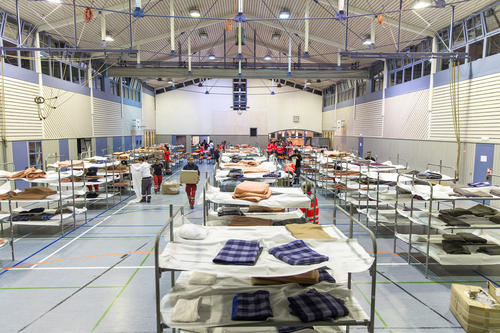Doing the Right Thing with Certainty
In the ENSURE project, an app brings volunteers and first responders together in a disaster.
Jun 28, 2016
The ENSURE project can be used to call on residents for help in various ways, including to set up emergency shelters.
Image Credit: CC by nc Franz Ferdinand Photography/flickr
Sometimes time is truly of the essence. That is true in a natural disaster, such as when flooding threatens a city, and in providing assistance to refugees, when facilities such as gymnasiums have to be converted to emergency shelters in a hurry. Oftentimes, it is ordinary people from the local population who pitch in to help during times of crisis or disaster, contributing their time and knowledge to help first responders from the fire department or Red Cross on site.
But cooperation between professional responders and the civilian population is not without its issues. In most cases, responders do not know whether volunteers will be there to help out or how many there will be, let alone what qualifications these helpers bring with hem. A skilled caretaker or custodian is probably needed in a different place from a pediatrician. “Without information about the volunteers, first responders cannot plan appropriately – so they might ask the wrong people, or too many people, to go to a certain site. In the worst case, helpers end up getting in each other’s way,” says Roman Peperhove of the Interdisciplinary Security Research work group at Freie Universität Berlin.
With this in mind, Peperhove and his team are participating in a research alliance that is working to develop a system that can be used to effectively coordinate the work of professional first responders and volunteers. The name of the project is ENSURE. Funded by the German Federal Ministry of Education and Research (BMBF), it brings together researchers from various institutions in Berlin and practitioners from the German Red Cross and the Berlin fire department.
Three years of research on the project has yielded an app that can be used to alert and inform potential helpers on a targeted basis in crisis situations. Interested individuals can sign up on the ENSURE website and list their specific skills. A call for help from the Berlin fire department goes out specifically to people near the site, ideally those with the desired qualifications. Those who have received the alert also use the app to respond, letting first responders know whether they can be counted on to help. “The idea isn’t to take the place of professional responders, but instead to pick up the slack and help them,” Peperhove says.
The project’s full name is “ENablement of Urban Citizen SUpport for Crisis REsponse.” It was launched in 2013. The app is still in the trial phase at present.
The project involves researchers from the Interdisciplinary Security Research work group headed by Professor Lars Gerhold and the Disaster Research Unit at Freie Universität Berlin along with other cooperation partners, including the Fraunhofer Institute for Open Communication Systems (FOCUS), Human-Factor-Consult GmbH, and Technische Universität Berlin. Expertise on compliance with German data protection and privacy laws is supplied by another project partner: the German Association for Data Protection and Data Security (GDD).
The initial goal was to improve disaster preparedness and responses in major disasters such as earthquakes, explosions, and flooding. The ENSURE project has now also been expanded to include aid to refugees. Setting up beds or distributing food on short notice – the Berlin fire department had previously used social media such as Facebook and Twitter to reach out to local residents for help in these kinds of cases. The group of potential helpers is huge: There are more than 40,000 users following the Berlin fire department on Facebook alone. “But the problem with these networks is that there is no feedback channel through which volunteers can give a firm yes or no answer,” Peperhove says.
“We believe contacting app users directly and asking them to respond will bring greater reliability among volunteers,” says Agnetha Schuchardt, a researcher working on the project. The ENSURE app will be tested this summer in cooperation with the Berlin fire department and the German Red Cross. Not long from now, in late July, potential volunteers will be able to download the app via the App Store for iOS or from Google Play for the Android system and use it for scheduled refugee aid operations in Berlin. Peperhove and Schuchardt are optimistic that everything will go very quickly at that point.
Further Information
Roman Peperhove, Public Safety Research Forum, Freie Universität Berlin, Tel.: +49 30 838 60430, Email: roman.peperhove@fu-berlin.de
Link to the Homepage: www.sicherheit-forschung.de

